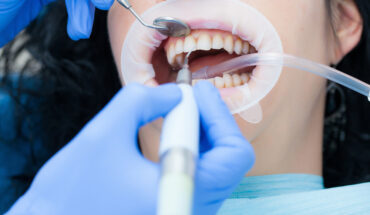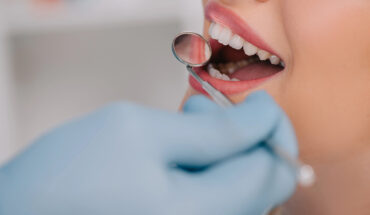
Cosmetic dentistry has changed the ways people can achieve their perfect smiles. From teeth whitening to porcelain veneers, to dental implants and complete smile transformations, these procedures can improve both the appearance as well as functionality of your teeth. But, keeping the effects will require more than just admiring your beautiful smile. It also requires the same and consistent treatment plan for your mouth. Regular maintenance not only protects the aesthetic advantages but also ensures that your dental health is in good state. In some instances dental visits after a procedure may reveal serious issues such as oral cancer, which the dentist might detect, which makes regular visits vital.
This article will discuss the best practices to keep your cosmetic dentistry in top condition, ensuring longevity of outcomes.
1. Prioritize Gentle Oral Hygiene Practices
Following an aesthetic dental procedure your gums and teeth may become more sensitive particularly those who have had procedures such as dental bonding, veneers and gum contouring. Utilizing gentle techniques for oral care can help avoid irritation or harm to the areas treated.
- Pick a soft bristled Toothbrush The toothbrush with soft bristles are perfect for cleaning around the crowns and veneers, without creating scratches.
- Make sure to use non-abrasive toothpaste. Abrasive or whitening toothpastes may cause damage to aesthetic restorations in time. Opt for a gentle non-abrasive formulation specifically formulated to maintain cosmetic dentistry.
- Be Careful when you floss: While flossing is a must but it’s also crucial to be gentle around dental work. For teeth with veneers or bonds you should consider waxed or tap floss in order to prevent removing the material.
2. Maintain Regular Dental Check-Ups
Routine visits to your cosmetic dentist are crucial for ensuring the longevity of your smile makeover. During these visits, the dentist will examine the condition of your restorations, perform a professional cleaning, and address any potential issues prior to them becoming serious.
Moreover, regular dental check-ups can reveal hidden conditions. For instance, during these check-ups there is a possibility that dental cancers in the mouth could be discovered by your dentist. find, thereby providing an early diagnosis and treatment feasible. This is why it’s important to not skipping your follow-up appointments even if your smile is flawless.
- Plan Biannual Visits to Schedule: Plan for check-ups every two years to check the health that your dental work as well as general health of your mouth.
- Professional Cleanings: These services help get rid of surface and tartar stains that brushing regularly could leave behind keeping the shine of your smile.
- Oral Cancer Screening An extensive dental exam involves a screening for the symptoms of oral cancer which is often detected in the early stages by your dentist.
3. Avoid Stain-Causing Foods and Beverages
Even the most sophisticated cosmetic dental procedures like veneers or teeth whitening are prone to staining as time passes. To ensure your smile is shining, you must avoid exposure to common irritants.
Foods and Drinks to Avoid:
- Tea, coffee and red wine These drinks contain tannins that could cause discoloration of teeth.
- Dark sauces like soy sauce, tomato sauce and curry are all known to cause dental stains.
- Colored candy and berries These foods contain pigments that may stick on dental crowns.
Rinse your mouth after eating food that has staining If you are guilty of coloring beverages or food items wash your mouth with water right away following the incident.
Use a straw when drinking beverages that are colored make sure you use straws to limit the direct contact between your teeth and.
4. Guard Your Smile from damage
Implants for cosmetic dentistry, though sturdy, aren’t impervious to damage. To ensure their longevity it is crucial to safeguard them from excessive wear and tear.
- Wear a night guard When you are prone to grinding your teeth frequently at in the night, a night guard will help prevent wear and also protect your restorations from cracking or chipping.
- Do not use your teeth to Work: Don’t utilize your teeth for opening packages or chew on hard objects, since this could cause damage to crowns, veneers, or even bonded teeth.
- Mindful Chewing: Take care when you consume hard food (e.g. or ice nuts, the hard kind of candy) to avoid breaking the cosmetic dental work.
5. Maintain Excellent Gum Health
Gums that are healthy are the basis of a gorgeous smile. Even with the best teeth or veneers gum disease could affect the results of your treatment by causing swelling, recession or even the failure of implants.
- Daily Flossing: Make sure to floss at least every day to get rid of plaque buildup from your dental structure and lower the chance of developing gum disease.
- Make use of an Antimicrobial Mouthwash: A non-alcohol mouthwash can keep gingivitis and plaque at bay while being gentle on restorations.
- Check for signs warning signs Gum Disease: Redness, bleeding or sensitivity around your crowns or veneers could be a sign of gum problems that require immediate treatment.
6. Use Whitening Products Wisely
Although professional teeth whitening can provide remarkable results, regular maintenance is essential to avoid discoloration. However, misuse of whitening solutions can cause damage to cosmetic restorations.
Opt for products recommended by dentists These products can be too rough for composite bonding or veneers. Always consult your cosmetic dentist for safe recommendations.
Touch-Up Whitening Treatments for Touch-Ups: Regular professional whitening touch-ups are a great way to keep the natural brightness of your teeth, and ensure that they are in line with your restorations.
7. Stay Hydrated and Promote Saliva Production
The role of saliva plays a crucial part in maintaining the health of your mouth through neutralization of acids sweeping away food particles and preventing dry mouth, a condition that could compromise the long-term results of cosmetic dental procedures.
- Drink plenty of water Staying hydrated keeps your mouth moist and helps maintain your overall oral health.
- Chew sugar-free gum It stimulates saliva production and aids in cleaning your teeth after meals.
- Limit Alcohol and caffeine: Both are known to cause dry and flaky mouths, which raises the likelihood of decay and can affect the durability of work done on the cosmetic.
Making the investment in cosmetic dentistry the first step to having a confident, radiant smile. However, the long-term durability of your results is dependent on the routine you follow for your dental care. By practicing gentle
cleanliness habits by avoiding foods that cause staining, and attending regular dental examinations will help prolong the life the cosmetic improvements you have. In addition frequent visits to the dentist
Cosmetic dentists can save lives, as oral cancer your dentist may discover could be identified early.
If you follow these guidelines, you will be able to have a beautiful and healthy smile for many long time to come. You can be sure your cosmetic dental investment will continue to shine.




